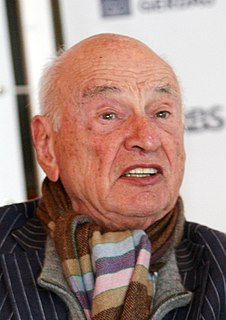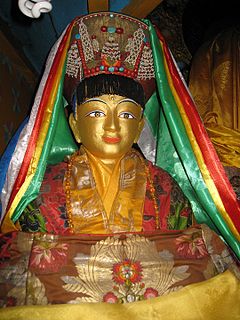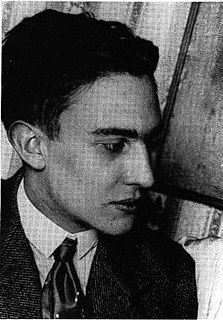A Quote by Edgar Morin
The certainty of death and the uncertainty of the hour of death is a source of grief throughout our life.
Quote Topics
Related Quotes
Animals learn death first at the moment of death;...man approaches death with the knowledge it is closer every hour, and this creates a feeling of uncertainty over his life, even for him who forgets in the business of life that annihilation is awaiting him. It is for this reason chiefly that we have philosophy and religion.
By 'coming to terms with life' I mean: the reality of death has become a definite part of my life; my life has, so to speak, been extended by death, by my looking death in the eye and accepting it, by accepting destruction as part of life and no longer wasting my energies on fear of death or the refusal to acknowledge its inevitability. It sounds paradoxical: by excluding death from our life we cannot live a full life, and by admitting death into our life we enlarge and enrich it.
Death is a vast mystery, but there are two things we can say about it: It is absolutely certain that we will die, and it is uncertain when or how we will die. The only surety we have, then, is this uncertainty about the hour of our death, which we seize on as the excuse to postpone facing death directly. We are like children who cover their eyes in a game of hide and seek and think that no one can see them.
Everybody is afraid of death for the simple reason that we have not tasted of life yet. The man who knows what life is, is never afraid of death; he welcomes death. Whenever death comes he hugs death, he embraces death, he welcomes death, he receives death as a guest. To the man who has not known what life is, death is an enemy; and to the man who knows what life is, death is the ultimate crescendo of life.
The greatest mystery in life is not life itself, but death. Death is the culmination of life, the ultimate blossoming of life. In death the whole life is summed up, in death you arrive. Life is a pilgrimage towards death. From the very beginning, death is coming. From the moment of birth, death has started coming towards you, you have started moving towards death.
Birth leads to death, death precedes birth. So if you want to see life as it really is, it is rounded on both the sides by death. Death is the beginning and death is again the end, and life is just the illusion in between. You feel alive between two deaths; the passage joining one death to another you call life. Buddha says this is not life. This life is dukkha - misery. This life is death.
Facing death calmly is praiseworthy only if one faces it alone. Death together is no longer death, even for unbelievers. The source of sorrows lies not in leaving life, but in leaving that which gives it meaning. When love is our whole life, what difference is there between living together and dying together ?
It is a common error, and the greater and more mischievous for being so common, to believe that repentance best becomes and most concerns dying men. Indeed, what is necessary every hour of our life is necessary in the hour of death too, and as long as one lives he will have need of repentance, and therefore it is necessary in the hour of death too; but he who hath constantly exercised himself in it in his health and vigor, will do it with less pain in his sickness and weakness; and he who hath practiced it all his life, will do it with more ease and less perplexity in the hour of his death.
We are left with nothing but death, the irreducible fact of our own mortality. Death after a long illness we can accept with resignation. Even accidental death we can ascribe to fate. But for a man to die of no apparent cause, for a man to die simply because he is a man, brings us so close to the invisible boundary between life and death that we no longer know which side we are on. Life becomes death, and it is as if this death has owned this life all along. Death without warning. Which is to say: life stops. And it can stop at any moment.






































